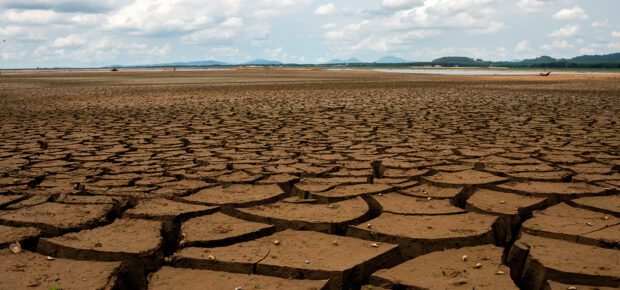January 28, 2025
Drought is an age-old foe, responsible for crop failures and famine. It has even toppled empires. But satellites and precision agriculture are rewriting that story, raising hope that humanity could turn a centuries-old scourge into a manageable challenge.
“Plants are central to a wide range of human needs, including food, fiber for clothing, animal feed and even energy. A changing climate threatens those needs,” according to IEEE Member Euclides Chuma.
“Plants are essential for a sustainable human lifestyle. Therefore, drought monitoring is essential so humans can understand the impact of climate change on agriculture and have time to take action for drought mitigation,” Chuma added.
Monitoring Drought From Space
Satellites can be useful for monitoring drought in two main ways. First, they can offer high-quality images with special cameras.
“Satellites measure different wavelengths of the electromagnetic spectrum to analyze conditions on the ground and weather in the air,” said IEEE Senior Member Shawn Chandler. “The satellite functions by assessing the absorption and emission of different wavelengths of energy such as infrared, microwave and visible light.”
Using visible light sensing, satellites can monitor water levels in lakes and rivers and determine amounts of vegetation cover across large land areas as indicators of drought, Chandler explains. They can also monitor precipitation, temperature and contribute to evaluations of short-term weather patterns, which contribute to the understanding of soil moisture levels. Satellites using microwave sensing technology can observe soil moisture due to water’s scattering effect, and based on known crop types, can help to determine anomalies and threats to crop health.
The emerging use of low-orbit satellites offers a second path to drought monitoring because they provide internet connectivity for remote areas. Global connectivity in agricultural fields allows farmers to use smart sensors to transmit data on soil and plant status to data centers, where high-powered computers can make sense of the information. The integration of satellite imagery and IoTs devices offers a comprehensive approach to drought management.
That integration of internet-connected smart sensors in farms is often referred to as precision farming, which seeks to find a “goldilocks zone” for plants — not too much water that it evaporates and is wasted, but not so little that the plant grows less than it could.
“Omnipresent internet connections and IoT technology will offer a lot of precision data that can be used in conjunction with AI algorithms to identify drought in farms much more than it is today,” Chuma said.
On the Horizon: Using Cellular Infrastructure To Monitor Drought
One reason satellites have been deployed to monitor drought is that there simply aren’t enough sensors in enough places on earth to do the job adequately. In recent years, however, there has been increased interest in using data from systems or technologies that weren’t originally designed to monitor weather.
The practice is known as opportunistic sensing. One method that has gained traction is to rely on data from cell phone towers to monitor rain – or the lack of it. The idea is based on the fact that cellular technology has become ubiquitous. Wherever there are people, there are cellular towers. In 2006, IEEE Life Fellow Hagit Messer and a team of researchers realized that signals in cellular towers changed in response to different weather patterns, and this data could be used for environmental monitoring. Messer, who won the 2024 IEEE Medal for Environmental and Safety Technologies for the research, later showed that the system could also be used for early flood warning.
Learn More: Check out the IEEE Planet Positive 2030 Initiative from the IEEE Standards Association. It’s an all-of-IEEE effort to bring together technologists, economists, sociologists, educators, policy-makers and others to identify sustainable and practical technology solutions.





 Meaningful Momentum or Running in Place?
Meaningful Momentum or Running in Place? AI Through Our Ages
AI Through Our Ages Liquid Infrastructure: Our Planet's Most Precious Resource
Liquid Infrastructure: Our Planet's Most Precious Resource The Impact of Technology in 2025
The Impact of Technology in 2025 Quantum and AI: Safeguards or Threats to Cybersecurity?
Quantum and AI: Safeguards or Threats to Cybersecurity? Why AI Can't Live Without Us
Why AI Can't Live Without Us Bits, Bytes, Buildings and Bridges: Digital-Driven Infrastructure
Bits, Bytes, Buildings and Bridges: Digital-Driven Infrastructure Impact of Technology in 2024
Impact of Technology in 2024 Emerging AI Cybersecurity Challenges and Solutions
Emerging AI Cybersecurity Challenges and Solutions The Skies are Unlimited
The Skies are Unlimited Smart Cities 2030: How Tech is Reshaping Urbanscapes
Smart Cities 2030: How Tech is Reshaping Urbanscapes Impact of Technology 2023
Impact of Technology 2023 Cybersecurity for Life-Changing Innovations
Cybersecurity for Life-Changing Innovations Smarter Wearables Healthier Life
Smarter Wearables Healthier Life Infrastructure In Motion
Infrastructure In Motion The Impact of Tech in 2022 and Beyond
The Impact of Tech in 2022 and Beyond Cybersecurity, Technology and Protecting Our World
Cybersecurity, Technology and Protecting Our World How Technology Helps us Understand Our Health and Wellness
How Technology Helps us Understand Our Health and Wellness The Resilience of Humanity
The Resilience of Humanity Harnessing and Sustaining our Natural Resources
Harnessing and Sustaining our Natural Resources Creating Healthy Spaces Through Technology
Creating Healthy Spaces Through Technology Exceptional Infrastructure Challenges, Technology and Humanity
Exceptional Infrastructure Challenges, Technology and Humanity The Global Impact of IEEE's 802 Standards
The Global Impact of IEEE's 802 Standards Scenes of our Cyber Lives: The Security Threats and Technology Solutions Protecting Us
Scenes of our Cyber Lives: The Security Threats and Technology Solutions Protecting Us How Millennial Parents are Embracing Health and Wellness Technologies for Their Generation Alpha Kids
How Millennial Parents are Embracing Health and Wellness Technologies for Their Generation Alpha Kids Space Exploration, Technology and Our Lives
Space Exploration, Technology and Our Lives Global Innovation and the Environment
Global Innovation and the Environment How Technology, Privacy and Security are Changing Each Other (And Us)
How Technology, Privacy and Security are Changing Each Other (And Us) Find us in booth 31506, LVCC South Hall 3 and experience the Technology Moon Walk
Find us in booth 31506, LVCC South Hall 3 and experience the Technology Moon Walk Virtual and Mixed Reality
Virtual and Mixed Reality How Robots are Improving our Health
How Robots are Improving our Health IEEE Experts and the Robots They are Teaching
IEEE Experts and the Robots They are Teaching See how millennial parents around the world see AI impacting the lives of their tech-infused offspring
See how millennial parents around the world see AI impacting the lives of their tech-infused offspring Take the journey from farm to table and learn how IoT will help us reach the rising demand for food production
Take the journey from farm to table and learn how IoT will help us reach the rising demand for food production Watch technical experts discuss the latest cyber threats
Watch technical experts discuss the latest cyber threats Explore how researchers, teachers, explorers, healthcare and medical professionals use immersive technologies
Explore how researchers, teachers, explorers, healthcare and medical professionals use immersive technologies Follow the timeline to see how Generation AI will be impacted by technology
Follow the timeline to see how Generation AI will be impacted by technology Learn how your IoT data can be used by experiencing a day in a connected life
Learn how your IoT data can be used by experiencing a day in a connected life Listen to technical experts discuss the biggest security threats today
Listen to technical experts discuss the biggest security threats today See how tech has influenced and evolved with the Games
See how tech has influenced and evolved with the Games Enter our virtual home to explore the IoT (Internet of Things) technologies
Enter our virtual home to explore the IoT (Internet of Things) technologies Explore an interactive map showcasing exciting innovations in robotics
Explore an interactive map showcasing exciting innovations in robotics Interactively explore A.I. in recent Hollywood movies
Interactively explore A.I. in recent Hollywood movies Get immersed in technologies that will improve patients' lives
Get immersed in technologies that will improve patients' lives